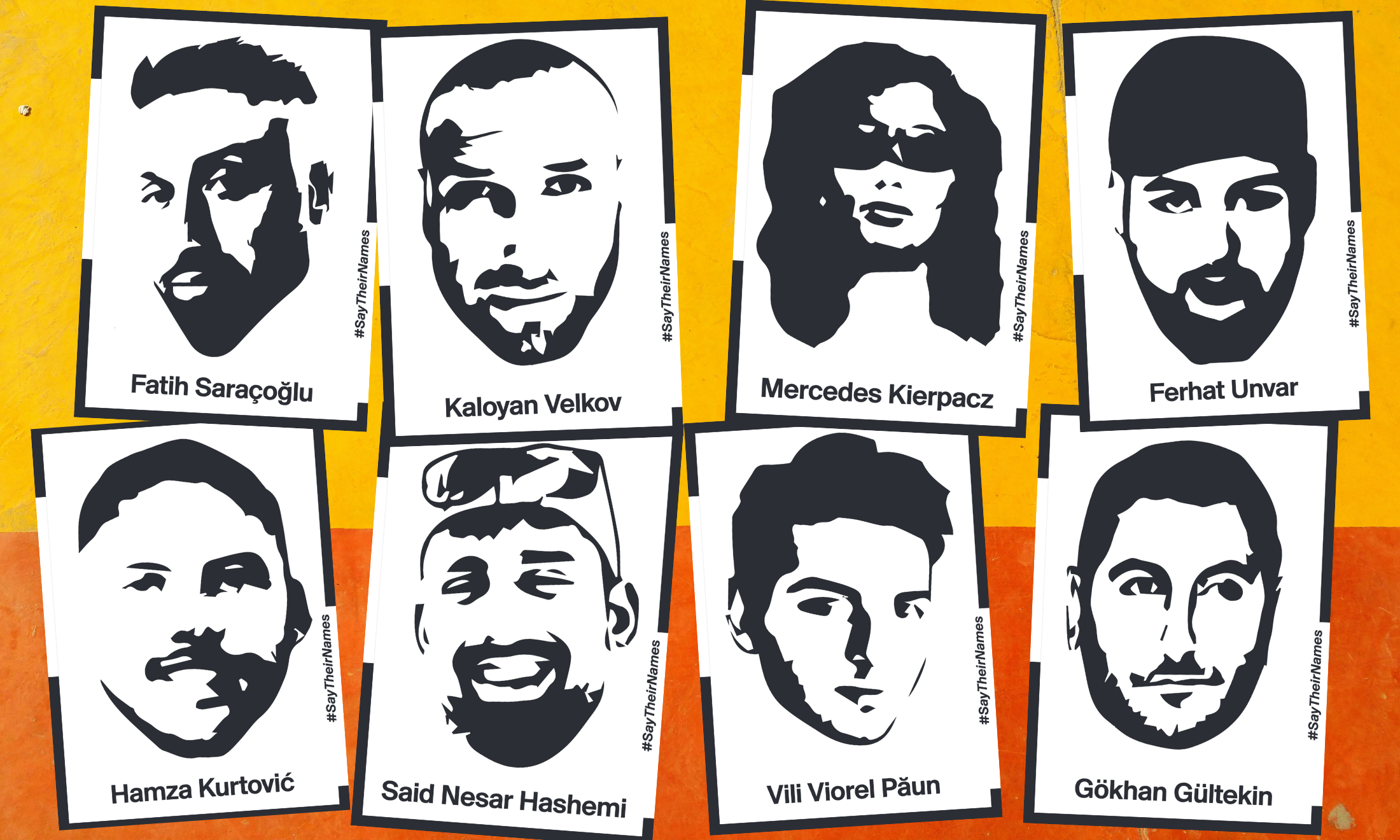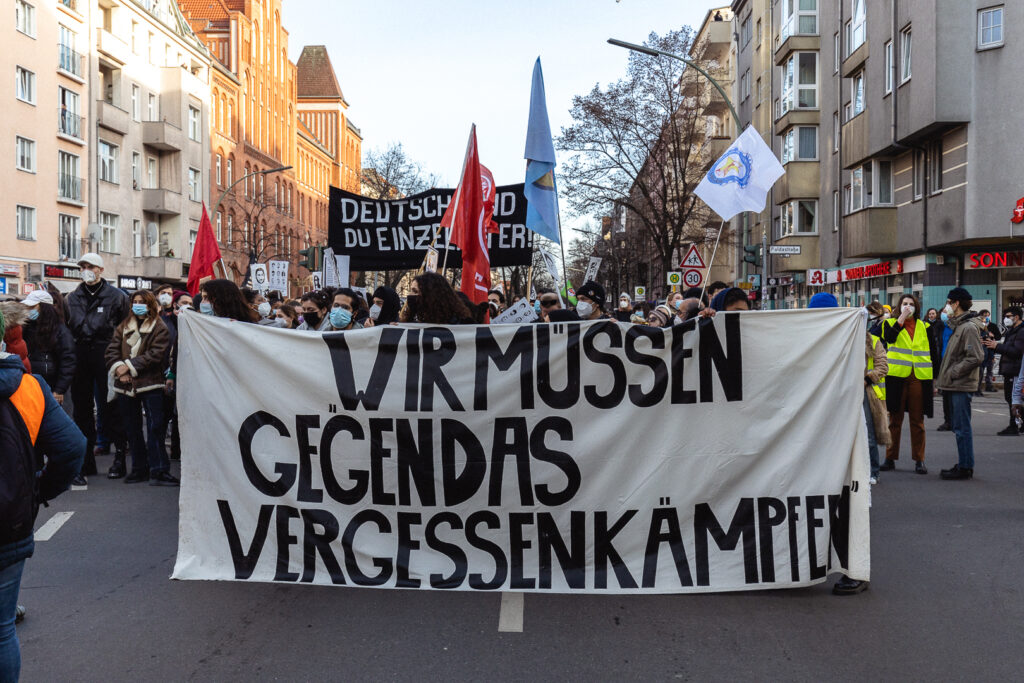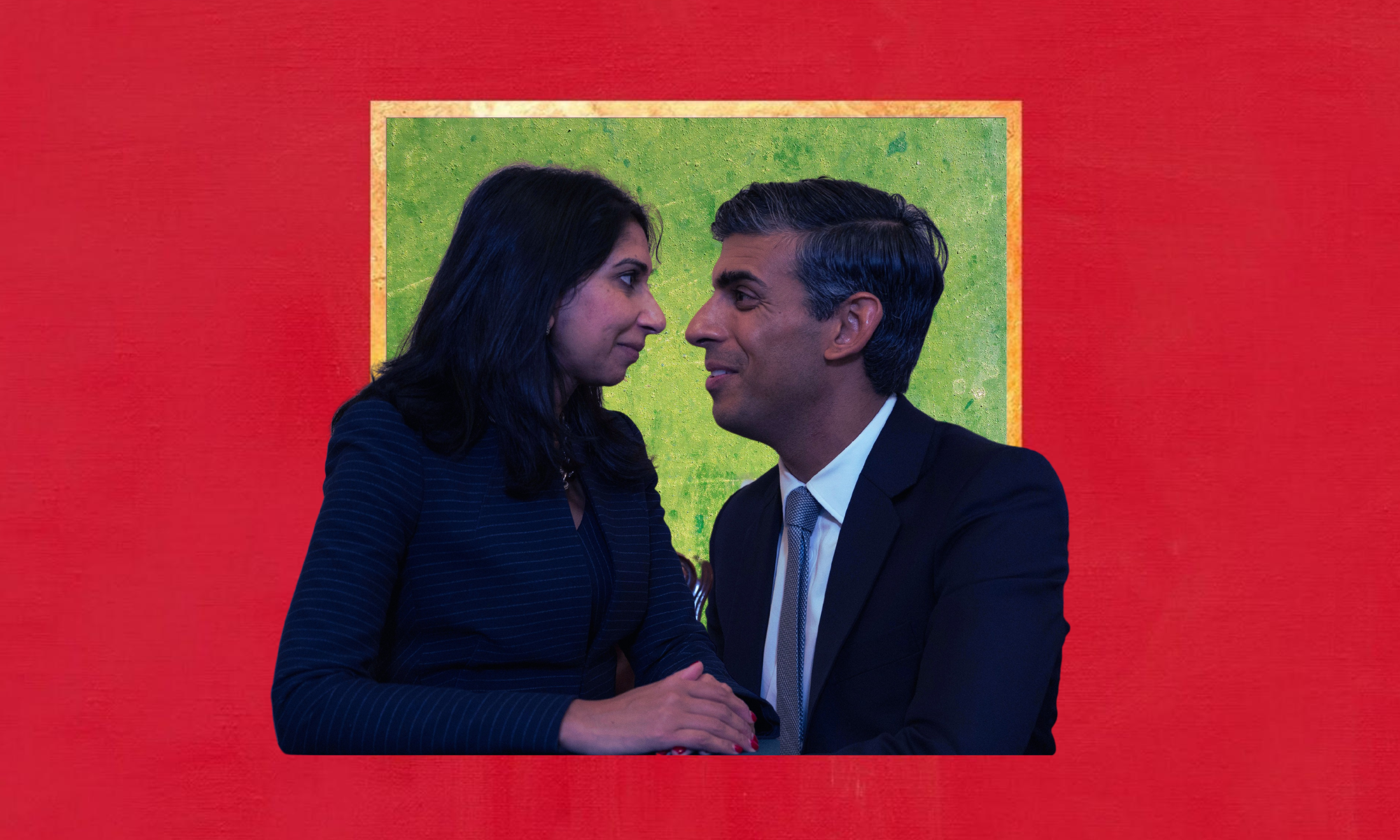Two years after the Hanau attacks, grieving families have been forced to become activists
The murders of nine people of migrant backgrounds should have signalled change in Germany. Instead, the burden of action has fallen on the bereaved.
Asiya Ahmed
18 Feb 2022

19 February Initiative
It took around seven hours for Serpil Unvar to find out her son was dead.
“The whole night I was hoping so much that Ferhat was in hospital. I had been told he wasn’t there amongst the victims,” she remembers.
It was the night of 19 February 2020. Twenty three year-old Ferhat Unvar had headed out earlier to meet friends at the nearby Arena Bar, a popular shisha spot in the Kesselstadt district of Hanau, a small German city near Frankfurt. But as she was getting ready for bed, Serpil Unvar received news from her daughter that would explode her world. Ferhat had been shot.
Serpil rushed to the scene of the attack. She pleaded with police officers for answers about her son’s whereabouts, but to no avail. “I kept asking the whole night, but still got no answer,” the 47-year-old says. “I had so much hope until 6.30am came. They named the victims. Ferhat’s name came last.”
Ferhat was one of nine victims of a shooting spree that would be memorialised as Germany’s most deadly racially motivated attack since 1945. To this day, Serpil, alongside other families and friends of the victims are still demanding answers from the state about its failures before, during and after the attacks.
The Hanau attacks
On the evening of 19 February, a white supremacist unleashed terror in Hanau on a killing rampage targeting people of colour at two separate shisha bars. Gökhan Gültekin, Ferhat Unvar, Mercedes Kierpacz, Said Nesar Hashemi, Sedat Gürbüz, Fatih Saraçoğlu, Hamza Kurtović, Kaloyan Velkov and Vili Viorel Păun all lay dead once the smoke cleared.
All of the nine who died at the first two crime scenes were from migrant backgrounds. Several others were injured. After the attacks, with police nowhere to be seen, the gunman – 43-year-old Tobias Rathjen – returned home to kill his mother and himself.
In the devastating aftermath of the Hanau tragedy, it emerged that there had been warning signs of Rathjen’s potential for violence, including a “confused letter, full of conspiracy theories”, sent to the chief prosecutor months earlier. Rathjen also uploaded a rambling, hate-filled digital ‘manifesto’ to his website ahead of the attacks which espoused far-right conspiracy theories and claimed that “people of certain African, Asian and Middle Eastern origins have to be ‘completely annihilated’” within Germany.
Despite these alarming red flags, and Rathjen’s legal possession of a weapon (the same type of pistol used by another mass shooter with far-right motivations in the 2016 Munich attacks), the authorities did not take the threat seriously. After the shooting, they tried to minimise the missed opportunities to prevent the murders – and the extremist motivation for them.
At an early stage of the investigation, Germany’s Federal Criminal Police Office (BKA) attempted to disentangle and isolate the perpetrator from the wider pattern of far-right violence in Germany by focussing on his paranoia. Later, they clarified that the attack was “clearly right-wing extremism”.
“From what he [the perpetrator] wrote and said to the outside world he seemed confused, and he was obviously mentally-ill,” says Leila*, a Berlin-based organiser with Migrantifa, a nationwide migrant-led anti-fascist organisation. “But the ideologies that he rooted himself in were right-wing extremism, racism and fascism,” she continues. “Saying it’s a single incident and not part of the wider problem avoids responsibility.”
A thriving culture of far-right extremism
Official records reveal that 1,200 far-right extremists legally possess weapons in Germany – an increase of almost 35% from 2019 to 2020.
“It’s completely absurd that they have a list and don’t disarm these people,” points out Newroz Duman from the 19 February Initiative, which was set up to support the community in Hanau after the attacks. “Racists need to be disarmed. When the state knows right-wing extremists are armed, they need to take those weapons away.”
Germany’s cycle of denial, acceptance and subsequent avoidance of its far-right terror crisis is the climate in which deadly far-right terror attacks take place. Hanau is considered the inevitable result of a buildup of state failures to address right-wing extremism. While it’s primarily families with migrant backgrounds who have been left to suffer the deadly consequences of right-wing violence in recent years, Germany’s well-armed mass of right-wing extremists poses a threat to society at large.
With talk of a “shadow army” likened to the nationalist military cells of the 1920s, the problem goes far beyond fringe extremists. Right-wing extremism is embedded in German society from the top down. Between January 2017 and March 2020, there were almost 380 suspected cases of right-wing extremist activity amongst individuals in state authority roles and within institutions – from the police to the intelligence service. The cases mostly focused on individuals who shared racist and antisemitic content in far-right chat groups, but some had contact with right-wing extremists, and others attended right-wing extremist events.
German police and military officers are regularly found participating in far-right circles and neo-Nazi chat groups, and even plotting right-wing terror. One shocking example is the story of Franco A., a German military officer who posed as a Syrian refugee and planned to commit attacks against politicians to fuel further resentment against refugees.
In several instances in recent years, Germany’s security services have been infiltrated by members of the far-right, using the special access and security privileges that come with being part of these services to stockpile weapons and explosives, compile enemy lists and send death threats with the help of police computers, and even plot coup attempts in preparation for Day X.
In the political sphere, extremist discourse has been fuelled by the influential far-right AfD political party (Alternative für Deutschland) who have managed to gain major political sway, while moving increasingly right-wards. While the 2021 elections saw national support for AfD decline, they have shorn up their position in east Germany, winning 24% of the vote in two states, and now also have access to federal campaign funding. But despite their clout, the AfD (founded in 2013) is by no means solely responsible for Germany’s far-right crisis.
“With talk of a “shadow army” likened to the nationalist military cells of the 1920s, the problem goes far beyond fringe extremists”
After the reunification of Germany, far-right attacks and racist murders rocked the country – especially in the early 1990s. The attacks took place as Germany simultaneously experienced an economic crisis, a new wave of migration, and an emboldened sense of patriotism among far-right groups in the newly reunified country.
Today, it’s easier to miss the extent of Germany’s problem with right-wing violence considering how the country projects a progressive exterior, but the process of “denazification” still has a long way to go.
Recounting the weight and continuity of right-wing terror, Serpil Unvar looks to the past. “They’ve learned for decades that there’s racist attacks,” she says ”So many mothers have cried until now, not just me.”
Between 2000 and 2007, a neo-Nazi terrorist network known as the National Socialist Underground (NSU) committed a series of deadly shootings in Germany killing 10 people, nine of whom were from Turkish and Greek backgrounds.
The police investigation exclusively looked into organised crime amongst people with Turkish backgrounds and ignored calls to investigate the murders as hate crimes. The vast majority of German media also failed the victims by ignoring the possibility that the chain of murders was racially motivated.
Instead, the media regurgitated police suspicions around organised crime – criminalising the victims themselves – and referred to the killings as “Dönermorde” (‘kebab murders’) because many of the victims worked in kebab shops. The victims’ families found the reference both “demeaning, and even racist”.

Credit: Veronica Schiavo
During their active period, the NSU also committed various other attacks, including two bombings and bank robberies. In a 2004 nail bomb attack, the group targeted a Turkish neighbourhood in Cologne, and injured 22 people, four of them seriously.
During the course of the investigation into the NSU, crucial documents containing information obtained by state informants were shredded by a member of Germany’s intelligence service, prompting accusations of a state-level cover up.
The list of right-wing attacks in more recent years is worryingly regular. From June 2019, over the course of just nine months, a neo-Nazi killed a politician for supporting then-Chancellor Angela Merkel’s refugee policy, and a right-wing extremist killed two people after attempting to attack a synagogue on Yom Kippur. Then came the Hanau attacks.
‘Designated’ targets
Shisha bars are a place of community and refuge for people from migrant backgrounds in Germany. “Migrants can be themselves at shisha bars because they are their spaces,” says Leila. They’re mostly run and frequented by migrants of Middle Eastern, North African, Turkish and Kurdish descent.
For Leila and countless others, it came as no surprise that the perpetrator of the Hanau attacks chose a shisha bar as his site of terror. “Shisha bars have been stigmatised by politicians and the right-wing press for years, making them an inevitable target of right-wing violence.”
As part of the state’s clampdown on organised crime, a strong focus is placed on “clan criminality”, defined as organised crime groups sharing an ethnic identity and strong family ties, usually from “Arab, Kurdish and Turkish” backgrounds. As a result, shisha bars – spaces where people from those backgrounds often hang out, and separately where, like many spaces, some crime can also take place – are subject to frequent police raids. However, the level of focus and media frenzy around “clan crime” is disproportionate, and serves to criminalise whole communities.
“Of course crime exists where poverty exists. But the discourse criminalises poor migrant communities overall, and in turn their spaces, like shisha bars, are seen purely as places of crime,” Leila explains.
Faced with no alternative, the victims’ families and activists have been forced into action to expose the state’s failures around the Hanau attacks. They’re fighting for “remembrance, justice, clarification and consequences”.
“As a result of having to become activists challenging state failures, some of the families feel they haven’t even had time to mourn their lost loved one”
In addition to organising rallies and hosting a monthly memorial in Hanau, the community has conducted in depth-research into the night of the attacks and brought new evidence to the media. They also commissioned research group Forensic Architecture to help investigate and reconstruct the attack at the Arena bar – a venue with a “troubling history of over-policing”.
Serpil Unvar took her quest right to the top and wrote to Angela Merkel, only to receive a cold response from the-then German premier, saying she had “passed [Serpil’s] letter on”.
It’s thanks to the persistence of the victims’ families and the hard work of community organisers that facts, and the prospect of accountability, are even on the table. Amongst other efforts, they’re involved in a committee of inquiry and are insisting on answers from relevant authorities to questions like: why the emergency line wasn’t working properly on the night of the attack? Why was the killer allowed to possess weapons in the first place? Why could they only see their children after autopsies were performed?
As a result of having to become activists challenging state failures, some of the families feel they haven’t even had time to mourn their lost loved ones. “We still haven’t had the time to experience our grief,” says Serpil. “We need to do the research, we need to ask the questions, we’ve had to become the police. We, as families, have had to do what the police should be doing – they’re not doing it.”
The impact of the attacks have also gone beyond emotional pain of bereavement for those left behind. “People’s lives have been turned upside down, many are heavily traumatised and can’t work,” says community organiser Newroz Duman. That’s why the 19 February Initiative has also been demanding financial support beyond the initial 30,000 euros awarded to the victims’ families.
Like father, like son
Newroz remembers the frustration felt at police treatment of the bereaved families following the attacks, compounded by the lack of support they’ve received in the face of worrying threats.
Hans-Gerd Rathjen, is known to authorities as sharing his son’s extremist beliefs and has proclaimed Tobias’ innocence in the aftermath of the murders. Members of the Hanau community have reported seeing the elder Rathjen “patrol[ling]” local streets and verbally assaulting people he believed to be immigrants. Magazine Der Spiegel also reported that Hans-Gerd Rathjen even pleaded for the return of his son’s weapons, the reactivation of his son’s website and the removal of the victims’ memorials.
The father believes he and his son are the real victims; victims of an influx of migrants and of the authorities. He regularly writes as much to prosecutors and editors at the Süddeutsche Zeitung, one of Germany’s largest newspapers. “This man is dangerous, the authorities need to react to this,” Newroz insists.
Not only dangerous, but close – with some of the bereaved families, including the Unvars, living extremely close him. The family of victim Gökhan Gültekin recently moved away from their neighbourhood of 26 years after no longer being able to face the crime scene, and struggling with the prospect of routinely seeing the father of their son’s murderer. Süddeutsche Zeitung recently reported that the families have filed a 16-page criminal complaint against the father for his suspected role in supporting, or at least not reporting his son’s deadly mission.
“As long as I live, I will tell the story of what happened”
The spate of extremist violence in Germany, the ongoing mishandling of the Hanau attacks, and mistreatment of the victims’ families raises serious concern that the state is still not tackling the issue of far-right terror seriously enough, nor the experiences of people of colour more broadly.
Leila spells out an experience that racialized people growing up in white majority countries know all too well. “When I talk to white German friends of mine, I feel like we live in entirely different societies,” she says. “We grew up in the same place, but we have a completely different perception of how things work and how things are.”
She believes that change will happen because of a growing sense among second and third generation children of migrants to become more involved in politics and community-building initiatives across Germany – the only home they know.
“The attacks confirmed that we can’t rely on the state for our safety and protection. We need to become politically active to protect ourselves and to stand together against the threats we’re facing in society and from the state,” says Leila.
Besides pursuing accountability from the state, Serpil has also set up the Ferhat Unvar Education Initiative to support and empower the next generation.
“As long as I live, I will tell the story of what happened and I will always bring the voices of other mothers and children further. When we support our children and the youth, they will achieve a lot. This is a fight for Ferhat and the youth.”
Serpil’s son Ferhat once wrote, “We are only dead when we are forgotten.” But it cannot fall to the marginalised alone to confront the enemy within. “Everyone carries responsibility,” says Newroz, gravely. ”We must all work to create change.”
In memory of Ferhat Unvar, Said Nesar Hashemi, Vili Viorel Păun, Mercedes Kierpacz, Sedat Gürbüz, Kaloyan Velkov, Fatih Saraçoğlu, Gökhan Gültekin and Hamza Kurtović.
*Names have been changed to protect identities

Britain’s policing was built on racism. Abolition is unavoidable

How Pakistan’s Khwaja Sira and transgender communities are fearing and fighting for their futures

Their anti-rape performance went viral globally. Now what?





